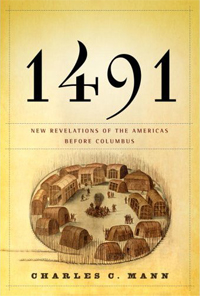1491
Tuesday, September 26th, 2017On Twitter someone recently asked, What book has changed the way you see the world?
I’ve just finished reading 1491: New Revelations of the Americas Before Columbus — and it’s been that kind of book for me.
 Written by Charles C. Mann and originally published in 2005, 1491 presents a view of the Americas before Columbus that is in sharp contrast to what most Americans my age learned in school.
Written by Charles C. Mann and originally published in 2005, 1491 presents a view of the Americas before Columbus that is in sharp contrast to what most Americans my age learned in school.
This is a fascinating, well-researched, and well-written book. I’d read articles and extracts based on it, but the details included in the full text really drive home the author’s main points:
• that the indigenous population of the Americas before Columbus was much higher, diverse, and sophisticated than has traditionally been believed;
• that between the arrival of Columbus and the settlement of what would become the American colonies, disease swept through both North and South America, decimating these once-large populations and wiping out civilizations;
• that because of this, North America only appeared to be a “virgin continent†and relatively unpopulated;
• that Indians** acted as a “keystone species†essentially engineering much of the landscape to suit their needs — for example, burning off the undergrowth in New England forests, modifying land for agriculture, encouraging the growth of nut-bearing and other useful trees, and discouraging the proliferation of species that competed for these resources.
What we think of today as North American wilderness and the “primeval†Amazon are both, in large part, recent phenomena, existing only since disease eliminated indigenous cultures.
This is compelling stuff on so many levels. First and most obviously, that many millions of people died of disease — up to 95% of the population by some estimates – and hundreds (thousands?) of cultures simply vanished.
Apocalypse is a popular topic in science fiction. What happens to a culture when 95% of its people suddenly die off? Nothing works after that. Technology, history, the complex network of human interaction that allows food to be grown and goods to be produced and traded simply vanishes. Those few who are left will be left with very little and no real means to replace what was lost. Mann uses the phrase “Holmberg’s Mistake†to describe the conclusion of an anthropologist who studied a “primitive†Amazon tribe and came to believe that these people had lived thus for thousands of years, not considering the possibility that they were the descendants of a handful who survived a real apocalypse. (more…)







